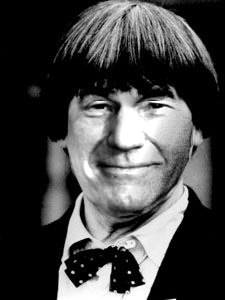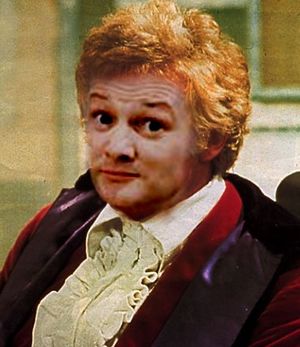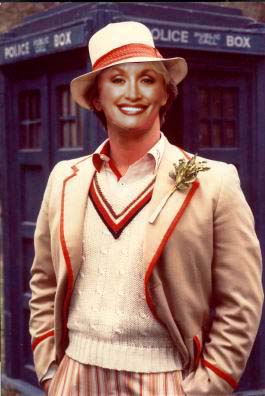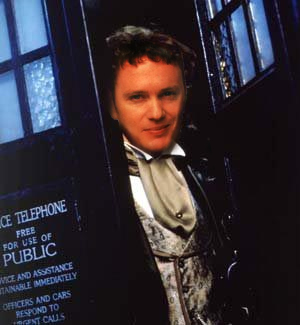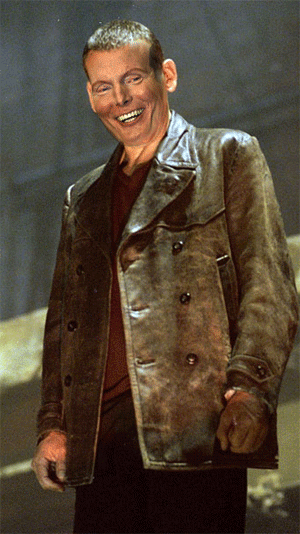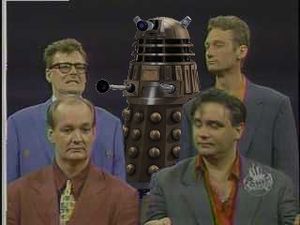User:Hinoa/drwho
| This article may be Overly British, as it was written by an American who really doesn't know jack about the UK. Don't change a thing to remedy this. |
Doctor Who is a British television programme produced by the BBC. The programme centres around The Doctor, a time-traveller, and the nearly-continuous party he has been throwing across time and space. Most episodes seem to deal with The Doctor saving the world/solar system/galaxy/universe/series continuity from total disaster completely by accident.
The Real Doctor Who[edit | edit source]
The TV series was originally inspired by an ordinary doctor who went mad and discovered time travel. Edward Who MD, was reported to have been a perfectly sane medical student until he went looking for his first job. A transcript of one of his early interviews has surived to this day:
"Hello, my name is Doctor Who, you will have received my application?"
- "Sorry, Doctor who?"
"Yes."
- "What?"
"No, Who"
- "who what?"
"No what, just Who"
- "ummm... Next please!"
After a dozen or so interviews following a similar pattern, Dr Who is thought to have become slightly unhinged, turning his considerable talent to researching time travel. For several years Who endured the ridicule of the scientific community, before mysteriously disappearing, along with a blue telephone box near his home. While most believe Dr Who simply emigrated, or possibly committed suicide, the legend remains that he transported himself into the future, refusing to share the secrets of time travel with the men who had mocked him for his ambition. From this legend, a legacy of mediocre TV was born.
The Doctor[edit | edit source]
The Doctor presents the programme in an unconventional indirect narrative fashion, talking to his assistant rather than the viewer, when explaining the issues under discussion. When the first actor to play the Doctor passed away in an accident with a wheelie-bin, the casting director took the brave decision of replacing him with a lookalike in the hope that the audience wouldn't notice. Unfortunately the casting director was blind. Viewers have come to accept the fact that the Doctor changes height, hair colour, build, wardrobe, gender and general physical appearance from time to time as part of the programme's charm.
The following actors have played The Doctor:
The First Doctor: William Shatner[edit | edit source]
When the first series of Doctor Who was commissioned in the 1960s, the BBC decided to spend a huge sum of money on a high-profile celebrity to boost initial ratings. They chose up-and-coming musician and writer William Shatner, of Tekwar and Ben Folds collaboration fame. Shatner portrayed Doctor Who as an eccentric Englishman with a midwest US accent, with bizarre taste in hats.
The pilot episode, "To Boldly Go", received 2,500 complaints from grammar fascists for the title alone.
The Second Doctor: Patrick Stewart[edit | edit source]
Following Shatner's unexpected death and subsequent recruitment to NBC television series Star Trek, the casting director attempted to cast a similar-looking actor as his replacement. Mistaking Patrick Stewart's outsized moptop wig for a silly hat, the plot device of The Doctor's "visual transmogrification" was born. Stewart's Doctor was a sterner, angrier man, portrayed as a Frenchman with an English accent. Amongs Stewart's Doctor's enemies were the cybermen, the yeti and Mary Whitehouse.
The Third Doctor: John Inman[edit | edit source]
Former civil servant John Inman took over as The Doctor when Patrick Stewart was poached by the Royal Shakespeare Company to play MacPicard in the film production of the Scottish Play, First Contact. Inman was an unpopular choice, especially given the plot had him stranded on Earth with a disfunctional Tardis, condemning the series to a load of stagnant plotlines relating to alien invasion. Luckily his assistant's constant barrage of "pussy" jokes lighened the mood somewhat.
The Fourth Doctor: Tom Jones[edit | edit source]
When Inman gave up television for a life of pantomime the producers decided to draft in Welsh pop idol and chest hair resource Tom Jones, in an attempt to draw a larger female audience. The ruse backfired when Jones had it written into his contract that he would rewrite and sing the theme tune. The lyrics to "What's New, Doctor Who?" have been lost in the annals of history. Thank fuck.
The Fifth Doctor: Dolly Parton[edit | edit source]
After Tom Jones was declared "far too Welsh" by avid sci-fi nerds the world over, the producers quickly brought in brash, obnoxious oil tycoon Dolly Parton to replace him, and in turn appease the fans. Unfortunately, she didn't go down too well with the fanbase, and many adults can still remember hiding behind the sofa in an attempt to get away from her shrill singing voice, which she used at the end of most episodes.
The Sixth Doctor: The Undertaker[edit | edit source]
When Dolly Parton lost an arm during an encounter with The Dialects, she was unable to continue filming because the writers weren't experienced enough to write her arm out of the series. Fans spent weeks speculating as to who the new Who would be, and after 5 minutes alone with him in his office, and two broken ribs later, The BBC director general called upon long time friend The Undertaker to fill in the role. The Undertaker took to the task like a cat to water, and was constantly abused by spotty pre-adolescents through the mail, but he told them to shut up or he'd give them all nipple-twists.
The Seventh Doctor: Sylvester the Cat[edit | edit source]
When The Undertaker eschewed his role as the Doctor in order to pursue his career as a TV chef, up and coming unknown Sylvester the Cat was drafted in to take up the role of the intrepid time-lord. Slight alterations had to be made to accomodate Sylvester, including a scratching post and a litter tray in the corner of the Tardis, which caused outcry amongst some of the more passionate fans. Despite all this, Sylvester remained a firm fan favourite right up until his demise at the hands of a giant saucer of milk from outer space in episode 26.8.
The Eighth Doctor: Craig McLachlan[edit | edit source]
After a good few years hiatus, the men upstairs decided to dust off the Doctor's bizarre hat and waistcoat, and bring him back in a one-off special in the form of ex Rising Damp star, Craig McLachlan. McLachlan was faced with one of the weakest enemies the Doctor would ever encounter, the Andrex Puppies, and many viewers fondly remember him climbing on top of the Tardis and screaming "For the love of God, please save me!" whilst shitting his knickers. Television would never be the same again, and as a result, Doctor Who was axed.
The Ninth Doctor: Christopher Reeve[edit | edit source]
The Doctor finally returned to our screens in early 2005, in an attempt to tempt todays youth into becoming doctors, due to the ever growing concerns over the NHS. In a controversial move, the BBC made the Doctor bald, Northern, cheeky, gay, fascist and Catholic in a bid to appeal to a wider target audience. Everyone enjoyed the first episode, but disaster struck when Reeve died of wheelchair of the legs in March. The story continues...----
The Tenth Doctor: David Duchovny (filming in progress)[edit | edit source]
The tenth series of Doctor Who promises more of everything: Knife fights, divorce, rape - it's got it all.
Duchovny is rumoured to be "fucking creaming [his] pants" at the thought of portraying the new Doctor, and says the money he will earn will help to pay for his crippling drug addiction.
The Tardis[edit | edit source]
The Tardis allows the series to explore historical events without breaking the narrative - the Doctor simply enters the time machine and emerges at a different point in history. "Tardis" is an acronym for "Thus Another Relocation Dilemma Is Solved", the words uttered by the series' producer when the device was first conceived.
The Tardis takes the form of a blue Police Call Box, an old form of concealment used by police officers. For example, in surveillance operations, a Police Box was often deployed outside the building under surveillance to allow police officers to stay within close proximity to the suspects without arousing suspicion. Unfortunately these boxes became a thing of the past when officers began using them for other private matters, such as solicitation... the public came to associate the blue boxes with immoral acts and they were all taken away and burnt in 1941.
This did not concern the producers of Doctor Who, who adopted one of the few surviving boxes as "the Tardis". Recently, however, the BBC lost a court battle with the musician Sting, who owns the trademark on the word "police", over the use of the Police Box, which also falls under his ownership. The 28th series of Doctor Who, currently in pre-production, is rumoured to use a Portaloo instead, rechristened "the Turdis".
Selected Plot Summaries[edit | edit source]
Season 12, Episode 2: The Invasion of Doom[edit | edit source]
In this episode, the Doctor, played by Tom Jones, uses the purchase of a new scarf from Harrods as a convenient excuse to explain Fourier Synthesis to the unsuspecting viewer. When his assistant reccommends that they use the Tardis to return to an earler time and get the scarf cheaper by reverse-inflation, her suggestion is shunned with a detailed description of the EPR Paradox and its connections to Stochastic Hydrodynamics. Instead they travel to 11th century London and engage in a discourse on moral philosophy with Edward the Confessor. A brief alien invasion is thwarted by the cunning use of Oleum (with accompanying dialogue on the industrial process of Sulphiric Acid manufacture), and the Doctor wins the day by convincing Harald Hardraada that Odin was gay.
Season 22, Episode 6: My Wonderful, Wonderful Neck[edit | edit source]
The Doctor, played by Sylvester the Cat, starts the episode at the bottom of a giant biscuit barrel on an alien mothership as a result of the previous episode, where he was lured there by his arch nemesis the Dialects by a nice bit of venison and a glass of chardonnay. The Doctor uses his bat-phone to call upon his beautiful assistant, Margaret (played by Adam West), and asks her to create a diversion by performing a heart-warming rendition of "935 bottles of beer". The Doctor then escapes his prison cell and defeats the Dialects by unplugging them from the mains, after a brief lecture on the benefits of solar power.
Season 27, Episode 1: Message in a Klein Bottle[edit | edit source]
The Doctor, played by the recently deceased Christopher Reeve, travels to London in the year 1965 to meet famed philosopher Gay Search and discuss the impact of feminism upon the moleskin industry. This is interrupted by a mob of angry clothes shop dummies, who attack with laser beams. After a brief exploration of the principles of quantum optics (cunningly linked back to the laser issue) the Doctor elects to travel to the year 2005 and tour the city in an attempt to get as many landmarks within camerashot as possible. Here he meets Thora, an precocious mathematician played by Billie Piper, who helps him to defeat the ghost of Gauss by integrating him over a non-Euclidian manifold.
Spin-offs[edit | edit source]
For some inexplicable reason, several attempts have been made to create a franchise of related series. Mercifully, most of these have failed utterly, but there have been a few notable exceptions.
Doctor Whose Line is it Anyway?[edit | edit source]
Doctor Whose Line is it Anyway? featured four contestants who were forced to improvise a convincing Doctor Who storyline, while being chased around by a Dalek.
The series was wildly popular among coma victims and household pets, but was suddenly cancelled in 1996, when the Dalek was accidentally released into the wrong studio and exterminated everyone on the set of Can't Cook, Won't Cook.
Immediately following its cancellation, the BBC wisely destroyed all existing copies of the series, even going so far as to hunt down and EX-TER-MI-NATE the entire cast and crew, just to be safe.
In 2002, a man claimed to have the every episode on video tape, and threatened to give them to the BBC unless he was paid £10,000. When the BBC was unable to raise the funds, public donations began to pour in, quickly exceeding the ransom demand by several thousand pounds. Before payment could be made, however, the identity of the man was discovered, and an angry mob dragged him from his home and poked him with pointy sticks, until he admitted that it had all been a hoax and that no such video tape actually existed.
Torchwood[edit | edit source]
- Main article: Torchwood
Torchwood (which is an anagram of "Ow! Hot Cord!") is intended as a darker, post-watershed version of Doctor Who, only without The Doctor, the TARDIS, or pretty much anything else from the series.
The show follows the adventures of Lieutenant Jack "Captain Jack" Black, a 51st century grifter from 1941 (or possibly a 1941 grifter from the 51st century) and a super-secret group of eccentric experts as they cruise around Cardiff, looking sexy and flashing lots of cool-looking alien gadgets.
After the success of Torchwood, the series Doctor What is currently planning to release its own edgy, anagram-based spin-off called Tworchtoad. It is currently in production, at an undisclosed location which is definitely not Cardiff.
Plans were also underway, at one point for another spin-off of the new series of Doctor Who, The Nora the Mathematician Variety Hour, but the show's creator withdrew his proposal, after being thrown out of a window, while attempting to pitch the series to BBC executives.


